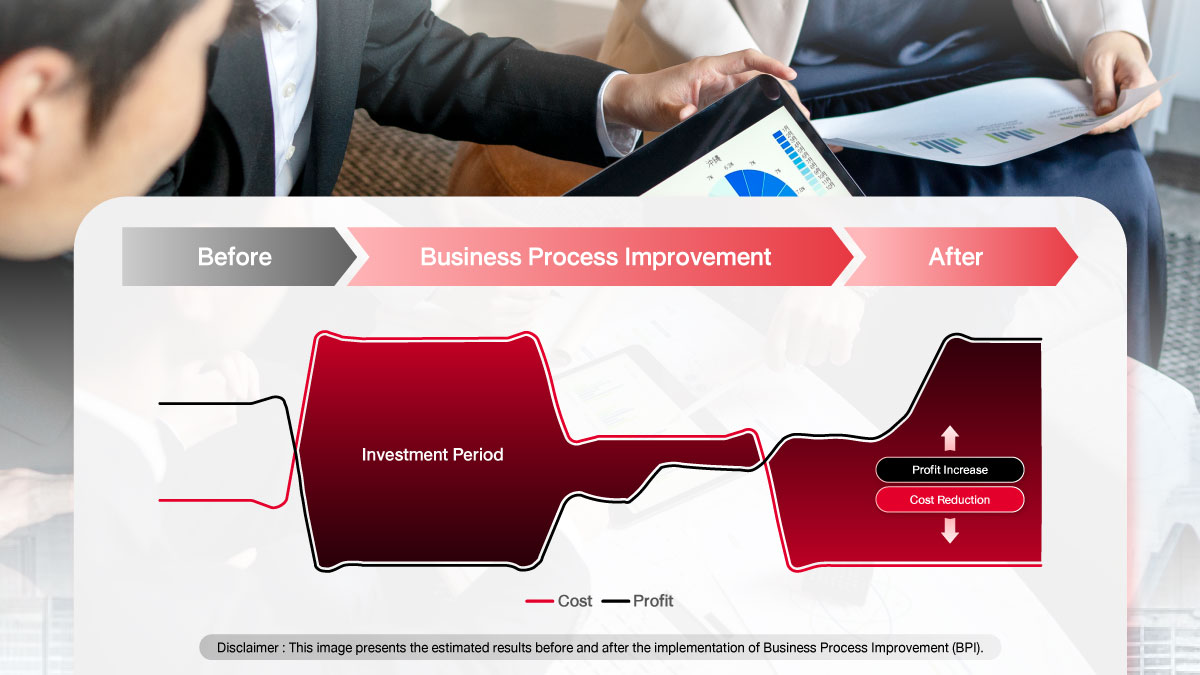Why Business Process Improvement is the Key to Success Cost Optimization?

In an era where businesses face rapid changes and heightened competition, improving and developing internal processes for greater efficiency has become a critical factor in helping organizations overcome challenges and maintain stability. One of the most effective methods for improving organizational operations is the concept of Business Process Improvement (BPI). This approach focuses on modifying, enhancing, and optimizing work processes to achieve maximum efficiency.
Contents
What is Business Process Improvement?
Business Process Improvement (BPI) refers to the process and service aimed at enhancing business processes to achieve greater efficiency and improved outcomes. It involves analyzing, designing, and discovering new strategies to solve problems or improve the quality of services and operations within an organization. BPI aims to deliver higher-quality results, faster execution, and reduced operational costs by employing thorough analysis of various business-related processes. This helps identify shortcomings or areas that can be optimized.
Steps in Implementing Business Process Improvement
The process of implementing Business Process Improvement can be divided into the following steps:
-
Analyze Existing Processes: The first step involves a detailed study and analysis of the current processes to identify problems or inefficiencies, such as redundant tasks, lengthy procedures, or frequent errors.
-
Design Improvement Strategies: Once the issues have been identified, a new strategy is designed to improve the process. This may involve using technology to increase efficiency or eliminating unnecessary steps to simplify the workflow.
-
Implement the Improvement: After the new process design is finalized, it is implemented within the organization. This step may include training employees to ensure a smooth transition to the improved process and to carry out tasks efficiently.
-
Measure Results and Continuously Improve: After the new process is implemented, its performance should be continuously measured to ensure improvement. If new problems are discovered, further adjustments can be made. Continuous improvement helps ensure the organization remains agile and responsive to changing conditions.
Benefits of transcosmos' BPI Service

- Dispatching services: play a crucial role in improving the speed and accuracy of task responses and enhancing the efficiency of operations for businesses or organizations.
- Increased Operational Efficiency: BPI helps identify and eliminate redundant or unnecessary steps in the workflow, making operations faster, reducing errors, and allowing teams to focus on critical business activities.
- Cost Reduction: Streamlining processes through BPI enables organizations to use resources more efficiently, cutting unnecessary costs and reducing operational expenses.
- Improved Customer Experience: Optimized business processes allow for higher-quality products and services to be delivered more quickly to customers. The increased responsiveness enhances customer satisfaction and loyalty.
- Competitive Advantage: By improving and optimizing internal processes, organizations can compete more effectively in the market. BPI also enables businesses to adapt quickly to market changes and economic conditions.
Business Process Improvement (BPI) is a vital tool that helps organizations enhance operational efficiency and reduce costs. Through analyzing and improving workflows, BPI enables businesses to improve internal processes, enhance customer satisfaction, and build long-term competitive advantages.





